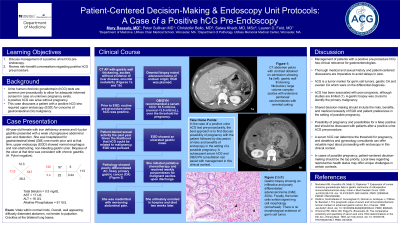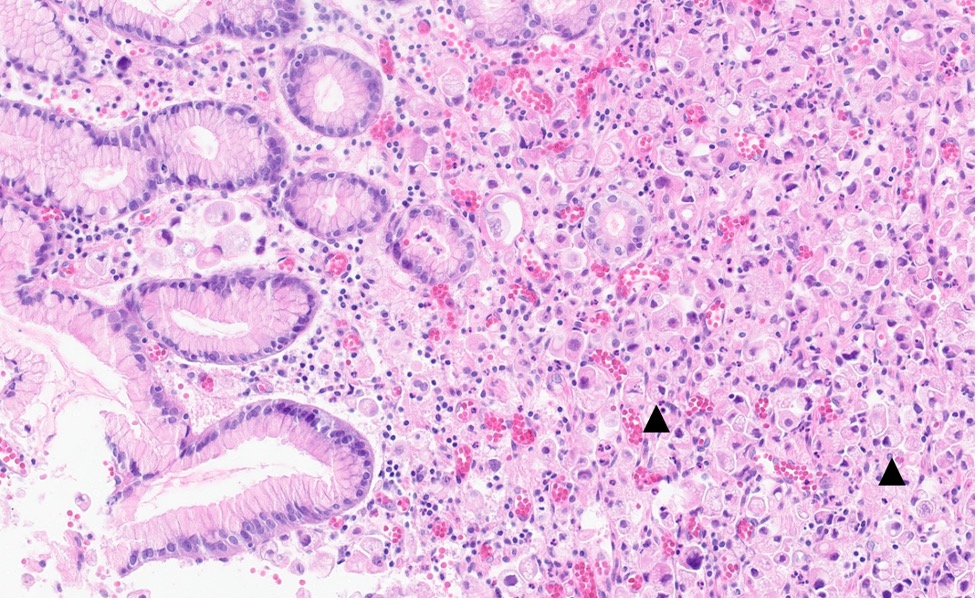Tuesday Poster Session
Category: Stomach
P5115 - Patient-Centered Decision-Making and Endoscopy Unit Protocols: A Case of a Positive hCG Pre-Endoscopy
Tuesday, October 29, 2024
10:30 AM - 4:00 PM ET
Location: Exhibit Hall E

Has Audio

Mary Bassaly, MD
University of Massachusetts Chan Medical School, MA
Presenting Author(s)
Mary Bassaly, MD1, Peter Sulivan, MD2, Lauren Feld, MD3, Christofer Bello, MD4, Salwa Khedr, MD, MSc5
1University of Massachusetts Chan Medical School, Worcester, MA; 2UMass, Worcester, MA; 3UMass Memorial Medical Center and UMass Chan Medical School, Worcester, MA; 4UMass Memorial Medical Center, UMass Chan Medical School, Worcester, MA; 5University of Massachusetts, Worcester, MA
Introduction: Urine human chorionic gonadotropin (hCG) tests are common pre-procedurally to allow for adequate informed consent in case an unknown pregnancy exists. However, a positive hCG can arise without pregnancy. This case discusses a patient with a positive hCG who required upper endoscopy (EGD) for concerns of gastrointestinal (GI) malignancy.
Case Description/Methods: A 49-year-old female with history of H pylori gastritis and peptic ulcer disease presented with a week of progressive abdominal pain and distention. She was hospitalized for GI bleed one-month prior. EGD showed a non-bleeding gastric ulcer, biopsy was consistent with chronic gastritis (H. Pylori negative).
Imaging on second admission showed ascites without evidence of liver disease, omental nodularity and an asymmetric, enlarged ovary. Omental biopsy noted adenocarcinoma (AC) of unclear origin and EGD was planned. Prior to EGD, routine pre-procedure urine hCG was positive. Subsequent serum hCG was 16.5 mlU/mL (normal < 3.0 mlU/mL), low but over the threshold for possible pregnancy. The patient denied sexual activity the past year. Given the importance of EGD and likelihood that hCG could be related to malignancy, EGD was pursued and showed a ulcerated gastric mass. Pathology showed poorly differentiated AC, likely primary gastric cancer (CA) (Figure 1).
She initiated palliative chemotherapy and received weekly paracenteses for malignant ascites on discharge. She was readmitted with worsening abdominal pain. She ultimately enrolled in hospice and died two weeks later.
Discussion: Management of patients with a positive pre-procedure hCG has clinical relevance for gastroenterologists. A thorough medical and sexual history and patient-centered discussions are imperative to avoid delays in care.
Our patient was not sexually active, and had concern for malignancy. hCG is a tumor marker for germ cell tumors, gastric CA and ovarian CA which were on the differential diagnosis. hCG has been associated with poor prognosis, although studies are limited. A gastric biopsy was crucial to identify the primary malignancy.
Likelihood of pregnancy and possibilities for a false positive test should be discussed with patients after a positive urine hCG pre-procedure. Shared decision-making should include the risks, benefits, and medical necessity of EGD and patient preferences in the setting of possible pregnancy. A serum hCG can determine the threshold for pregnancy, and gynecology can offer valuable input about proceeding with EGD in this clinical context.

Disclosures:
Mary Bassaly, MD1, Peter Sulivan, MD2, Lauren Feld, MD3, Christofer Bello, MD4, Salwa Khedr, MD, MSc5. P5115 - Patient-Centered Decision-Making and Endoscopy Unit Protocols: A Case of a Positive hCG Pre-Endoscopy, ACG 2024 Annual Scientific Meeting Abstracts. Philadelphia, PA: American College of Gastroenterology.
1University of Massachusetts Chan Medical School, Worcester, MA; 2UMass, Worcester, MA; 3UMass Memorial Medical Center and UMass Chan Medical School, Worcester, MA; 4UMass Memorial Medical Center, UMass Chan Medical School, Worcester, MA; 5University of Massachusetts, Worcester, MA
Introduction: Urine human chorionic gonadotropin (hCG) tests are common pre-procedurally to allow for adequate informed consent in case an unknown pregnancy exists. However, a positive hCG can arise without pregnancy. This case discusses a patient with a positive hCG who required upper endoscopy (EGD) for concerns of gastrointestinal (GI) malignancy.
Case Description/Methods: A 49-year-old female with history of H pylori gastritis and peptic ulcer disease presented with a week of progressive abdominal pain and distention. She was hospitalized for GI bleed one-month prior. EGD showed a non-bleeding gastric ulcer, biopsy was consistent with chronic gastritis (H. Pylori negative).
Imaging on second admission showed ascites without evidence of liver disease, omental nodularity and an asymmetric, enlarged ovary. Omental biopsy noted adenocarcinoma (AC) of unclear origin and EGD was planned. Prior to EGD, routine pre-procedure urine hCG was positive. Subsequent serum hCG was 16.5 mlU/mL (normal < 3.0 mlU/mL), low but over the threshold for possible pregnancy. The patient denied sexual activity the past year. Given the importance of EGD and likelihood that hCG could be related to malignancy, EGD was pursued and showed a ulcerated gastric mass. Pathology showed poorly differentiated AC, likely primary gastric cancer (CA) (Figure 1).
She initiated palliative chemotherapy and received weekly paracenteses for malignant ascites on discharge. She was readmitted with worsening abdominal pain. She ultimately enrolled in hospice and died two weeks later.
Discussion: Management of patients with a positive pre-procedure hCG has clinical relevance for gastroenterologists. A thorough medical and sexual history and patient-centered discussions are imperative to avoid delays in care.
Our patient was not sexually active, and had concern for malignancy. hCG is a tumor marker for germ cell tumors, gastric CA and ovarian CA which were on the differential diagnosis. hCG has been associated with poor prognosis, although studies are limited. A gastric biopsy was crucial to identify the primary malignancy.
Likelihood of pregnancy and possibilities for a false positive test should be discussed with patients after a positive urine hCG pre-procedure. Shared decision-making should include the risks, benefits, and medical necessity of EGD and patient preferences in the setting of possible pregnancy. A serum hCG can determine the threshold for pregnancy, and gynecology can offer valuable input about proceeding with EGD in this clinical context.

Figure: Gastric biopsy showing an infiltrative and poorly differentiated adenocarcinoma (H&E, 200x). Focally, the tumor cells exhibit signet ring cell morphology (arrowhead). There is no morphologic evidence of germ cell tumor.
Disclosures:
Mary Bassaly indicated no relevant financial relationships.
Peter Sulivan indicated no relevant financial relationships.
Lauren Feld indicated no relevant financial relationships.
Christofer Bello indicated no relevant financial relationships.
Salwa Khedr indicated no relevant financial relationships.
Mary Bassaly, MD1, Peter Sulivan, MD2, Lauren Feld, MD3, Christofer Bello, MD4, Salwa Khedr, MD, MSc5. P5115 - Patient-Centered Decision-Making and Endoscopy Unit Protocols: A Case of a Positive hCG Pre-Endoscopy, ACG 2024 Annual Scientific Meeting Abstracts. Philadelphia, PA: American College of Gastroenterology.
